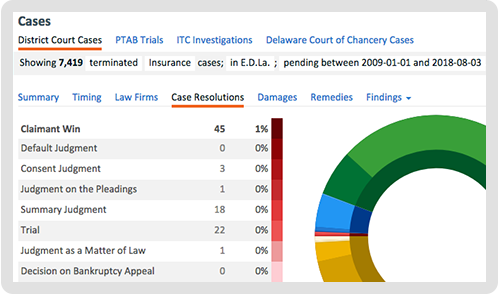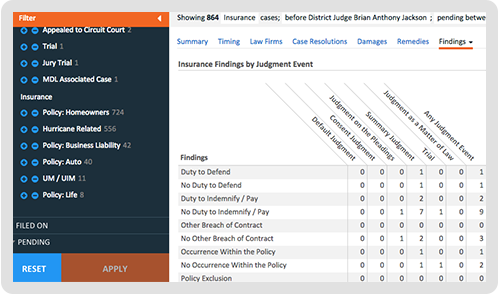Legal Analytics for Insurance Litigation
Lex Machina’s award-winning Legal Analytics platform allows outside counsel and in-house attorneys to predict the behavior of courts, judges, lawyers, law firms, and parties. Over half of Am Law 200 firms and some of the largest global corporations use Legal Analytics to supplement traditional legal research and reasoning with previously unavailable strategic insights that give them a winning edge. Now, Legal Analytics is available for insurance litigation in federal courts.
Legal Analytics provides data-driven insights and trends in insurance case timing, resolutions, damages, remedies, and findings. Our case set includes cases alleging breach of an insurance contract and cases seeking a determination of the rights of the parties to an insurance contract.
Whether you want to know at what stage a particular insurer settles cases involving homeowner’s policies, or what arguments have been successful in making claims for double or triple damages, Legal Analytics helps you win more business and win more insurance cases.

Use Cases
Lex Machina helps you answer questions such as:
- Over the past year, how many cases had a finding of insurance bad faith, and damages awarded? What were the specific damages amounts?
- How long does it take to reach summary judgment in the Eastern District of Pennsylvania? How does this compare to other district courts?
- Which law firms have the most experience representing defendants in business liability insurance cases in federal court?
- How has your judge ruled in prior insurance matters? Has she strictly enforced conditions precedent for insurance coverage?
Unique Insurance Litigation Data
Case Tags – Policy: Life, Policy: Auto, Policy: Business Liability, Policy: Homeowners, Uninsured / Underinsured Motorists, and Hurricane Related.
Damages – Contract, Tort, Emotional Distress, Enhanced, Punitive, and Restitution Damages, and Approved Class Action Settlement.
Findings – Over 40 findings specific to insurance litigation, such as: Duty to Indemnify/Pay, Duty to Defend, Occurrence Within the Policy, Policy Exclusion, Other Condition Precedent Met, and Failure to Pay Premium.
Remedies – Rescission and Reformation.

